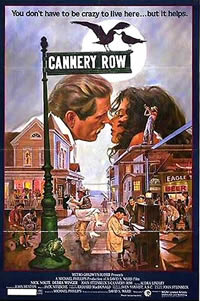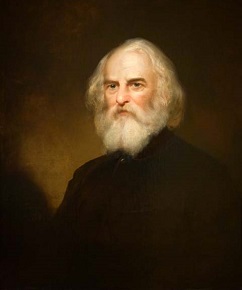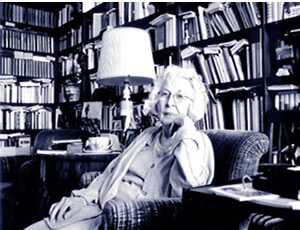De Amerikaanse schrijver John Steinbeck werd geboren in Salinas, Californië, op 27 februari 1902. Zie ook alle tags voor John Steinbeck op dit blog.
Uit: Cannery Row
“On the black earth on which the ice plants bloomed, hundreds of black stink bugs crawled. And many of them stuck their tails up in the air. “Look at all them stink bugs,” Hazel remarked, grateful to the bugs for being there.
“They’re interesting,” said Doc.
“Well, what they got their asses up in the air for?”
Doc rolled up his wool socks and put them in the rubber boots and from his pocket he brought out dry socks and a pair of thin moccasins. “I don’t know why,” he said. “I looked them up recently–they’re very common animals and one of the commonest things they do is put their tails up in the air. And in all the books there isn’t one mention of the fact that they put their tails up in the air or why.”
Hazel turned one of the stink bugs over with the toe of his wet tennis shoe and the shining black beetle strove madly with floundering legs to get upright again. “Well, why do you think they do it?”
“I think they’re praying,” said Doc.
“What!” Hazel was shocked.
“The remarkable thing,” said Doc, “isn’t that they put their tails up in the air–the really incredibly remarkable thing is that we find it remarkable. We can only use ourselves as yardsticks. If we did something as inexplicable and strange we’d probably be praying–so maybe they’re praying.”
“Let’s get the hell out of here,” said Hazel.”
(…)
“Hazel used his trick. “They got no starfish there?”
“They got no ocean there” said Doc.
“Oh!” said Hazel and he cast frantically about for a peg to hang a new question on. He hated to have a conversation die out like this. He wasn’t quick enough. While he was looking for a question Doc asked one. Hazel hated that, it meant casting about in his mind for an answer and casting about in Hazel’s mind was like wandering alone in a deserted museum. Hazel’s mind was choked with uncataloged exhibits. …”

John Steinbeck (27 februari 1902 – 20 december 1968)
Affiche voor de film “Cannary Row” uit 1982
De Britse dichter en schrijver Lawrence George Durrell werd geboren op 27 februari 1912 in Jalandhar in India. Zie ook alle tags voor Lawrence Durrell op dit blog.
Lesbos
The Pleiades are sinking calm as paint,
The earth’s huge camber follows out,
Turning in sleep, the oceanic curve.
Defined in concave like a human eye
Or a cheek pressed warm on the dark’s cheek,
Like dancers to a music they deserve.
This balcony, a moon-anointed shelf
Above a silent garden holds my bed.
I slept. But the dispiriting autumn moon,
In her slow expurgation of the sky
Needs company: is brooding on the dead,
And so am I now, so am I.
On First Looking Into Loeb’s Horace
Here, where your clear hand marked up
‘The hated cypress’ I added ‘Because it grew
On tombs, revealing his fear of autumn and the urns’,
Depicting a solitary at an upper window
Revising metaphors for the winter sea: ‘O
Dark head of storm-tossed curls’; or silently
Watching the North Star which like a fever burns
Away the envy and neglect of the common,
Shining on this terrace, lifting up in recreation
The sad heart of Horace who must have seen it only
As a metaphor for the self and its perfection_
A burning heart quite constant in its station.

Lawrence Durrell (27 februari 1912 – 7 november 1990)
De Canadese dichter, schrijver en essayist André Roy werd geboren op 27 februari 1944 in Montréal. Zie ook alle tags van André Roy op dit blog.
Filmaction
Filmaction :
la révélation des états du corps;
cinémâme :
l’apparition des vampires dans les ruines.
Le vent est affamé,
le ciel se renverse,
le feu nous mange.
Filme ceci, filme ce que nous sommes :
nos secrets en tant que détails de l’univers,
la grande inconnue qu’est le sexe-toujours,
le poème-partout.
Les lois pratiques de la lumière
Les lois pratiques de la lumière :
la transparence, la surimpression.
Ton regard est celui du dernier homme visible sur terre.
Ce que nous deviendrons mettra fin à l’histoire,
à la pure fiction du temps.
Herbes hautes, eaux vives, extérieurs palpables.
Les lois de la respiration du cœur.
Grande nudité de celui qui parle
en bougeant changeant crachant.
L’œil toujours très rond,
c’est une illusion, un cinématographe,
une machine pour jouir de toi.

André Roy (Montréal, 27 februari 1944)
Montréal, skyline
De Amerikaanse dichter Henry Wadsworth Longfellow werd geboren in Portland, Maine, op 27 februari 1807. Zie ook alle tags voor Henry Longfellow op dit blog.
Autumn
Thou comest, Autumn, heralded by the rain,
With banners, by great gales incessant fanned,
Brighter than brightest silks of Samarcand,
And stately oxen harnessed to thy wain!
Thou standest, like imperial Charlemagne,
Upon thy bridge of gold; thy royal hand
Outstretched with benedictions o’er the land,
Blessing the farms through all thy vast domain!
Thy shield is the red harvest moon, suspended
So long beneath the heaven’s o’er-hanging eaves;
Thy steps are by the farmer’s prayers attended;
Like flames upon an altar shine the sheaves;
And, following thee, in thy ovation splendid,
Thine almoner, the wind, scatters the golden leaves!
The Angler’s Song
From the river’s plashy bank,
Where the sedge grows green and rank,
And the twisted woodbine springs,
Upward speeds the morning lark
To its silver cloud — and hark!
On his way the woodman sings.
On the dim and misty lakes
Gloriously the morning breaks,
And the eagle’s on his cloud:–
Whilst the wind, with sighing, wooes
To its arms the chaste cold ooze,
And the rustling reeds pipe loud.
Where the embracing ivy holds
Close the hoar elm in its folds,
In the meadow’s fenny land,
And the winding river sweeps
Through its shallows and still deeps,–
Silent with my rod I stand.
But when sultry suns are high
Underneath the oak I lie
As it shades the water’s edge,
And I mark my line, away
In the wheeling eddy, play,
Tangling with the river sedge.
When the eye of evening looks
On green woods and winding brooks,
And the wind sighs o’er the lea,–
Woods and streams,– I leave you then,
While the shadow in the glen
Lengthens by the greenwood tree.

Henry Longfellow (27 februari 1807 – 24 maart 1882)
Portret door Thomas Buchanan Read, 1859
De Duitse schrijfster en dichteres Elisabeth Borchers werd geboren in Homberg op 27 februari 1926. Zie ook alle tags voor Elisabeth Borchers op dit blog.
Januar
Es kommt eine Zeit
da werden die Könige unruhig
und sie fragen ihre Diener
Wohin sollen wir gehen
Die Diener sehen sich an
und fragen
Wohin
Da stehen die Könige auf
und gehen
Es kommt eine Zeit
da werden die Sterne unruhig
und fragen
Wer ist der schönste unter uns
Und die Sterne sehen sich an
und fragen
Welcher mag es sein
Die Könige aber sagen
Ich heisse Balthasar
Ich heisse Melchior
Ich heisse Kaspar
Und Kaspar ruft
Da fliegt ein Stern
mit langem goldenem Haar
Februar
Es kommt eine Zeit
da sagt die Krähe
Ich mache jetzt eine lange Reise
Sie setzt sich auf eine Eisscholle
und treibt den Fluss hinunter
Die Welt ist weiß
vor lauter Schnee
nur ich bin schwarz
Krah-krah sagt die Krähe
das heißt
Schwarz-schwarz
Im Sommer möchte ich weiß sein
schneeweiß
Im Sommer möchte ich
eine Möwe sein
die ihre weißen Federn
über blaue Meere trägt

Elisabeth Borchers (27 februari 1926 – 25 september 2013)
De Amerikaanse schrijver James Thomas Farrell werd geboren op 27 februari 1904 in Chicago. Zie ook alle tags voor James T. Farrell op dit blog.
Uit: Young Lonigan
“They didn’t have ‘em as crazy as Vinc in Studs’ class; but there was TB McCarthy, who was always getting his ears beat off, and being made to kneel up in front of the room, or to go in Sister Bernadette’s room and sit with all the girls and let them laugh at him. And there was Reardon with horses’ hoofs for feet. One day in geography in the fifth grade, Cyrilla called on Reardon and asked him what the British Isles consisted of. Reardon didn’t know so Studs whispered to him to say iron, and Reardon said iron. Sister Cyrilla thought it was so funny she .marked him right for the day’s lesson. And St. Patrick’s meant Weary Reilley, and Studs hated Weary. He didn’t know whether or not he could lick Weary, and Weary was one tough customer, and the guys had been waiting for Studs and Weary to scrap ever since Weary had come to St. Patrick’s in the third grade. Studs was a little leery about mixing it with Reilley… no, he wasn’t… it was just… well, there was no use starting fights unless you had to… and he’d never backed out of a scrap with Weary Reilley or any other guy. And that time he had pasted Weary in the mush with an icy snowball, well, he hadn’t backed out of a fight when Weary started getting sore. He had just not meant to hit Weary with it, and in saying so he had only told the truth.
St. Patrick’s meant a lot of things. St. Patrick’s meant…..Lucy.
Lucy Scanlan would stand on the same stage with him in a few hours, and. she would receive her diploma. She would wear a white dress, just like his sister Frances, and Weary’s sister Fran, and she would receive her diploma. Everybody said that Fran Lonigan and Fran Reilley were the two prettiest girls in the class ell, if you asked him, the prettiest girl in the class was black-bobbed-haired Lucy.
He got soft, and felt like he was all mud and mush inside; held his hand over his heart, and told himself:
My Lucy!
He flicked some ashes in the sink, and said to himself: Lucy, I love you!“

James T. Farrell (27 februari 1904 – 22 augustus 1979)
Cover DVD van de mini-serie Studs Lonigan uit 1979
Zie voor nog meer schrijvers van de 27e februari ook mijn vorige blog van vandaag.
